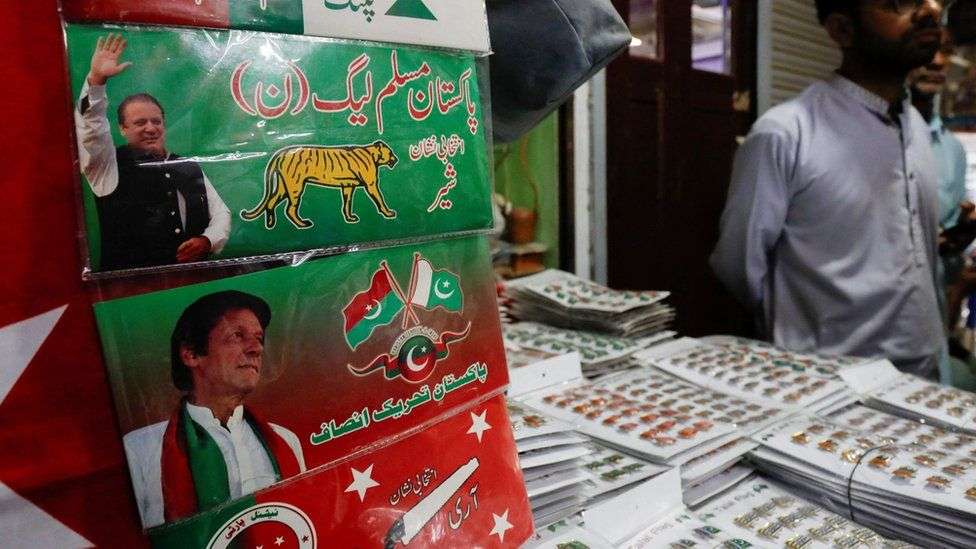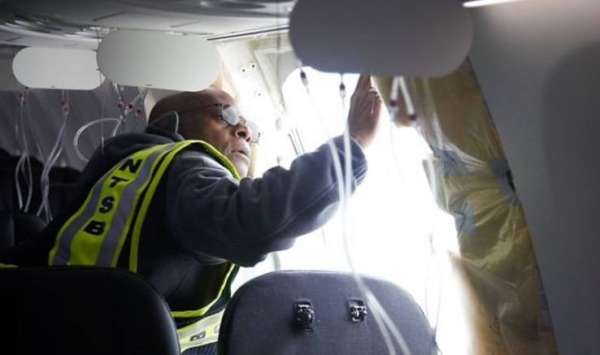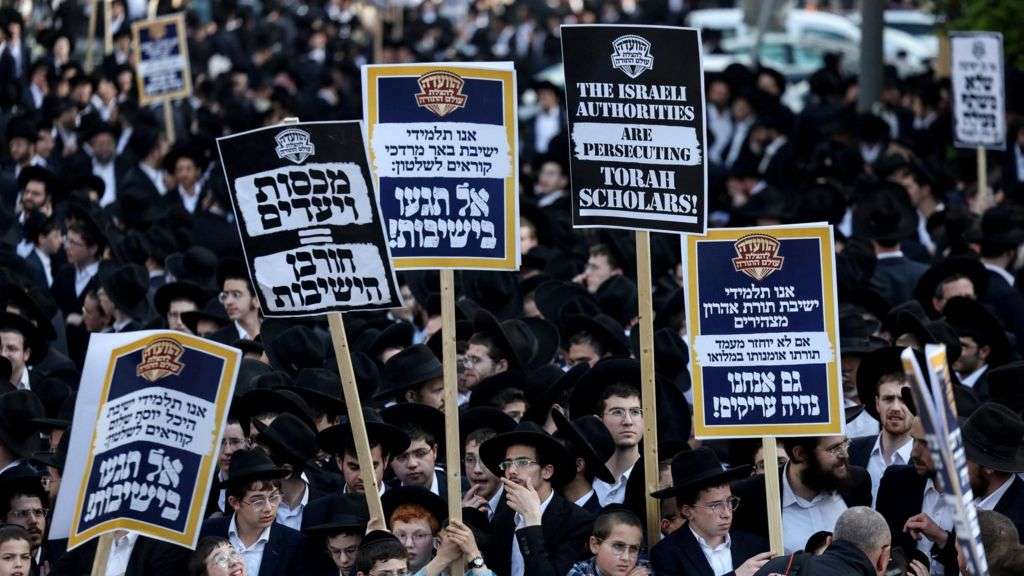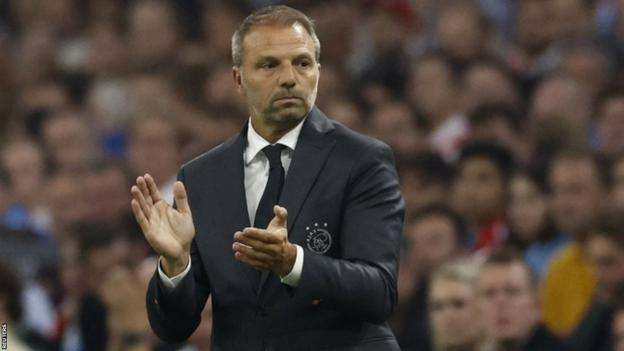Pakistan is in unprecedented times. Anger, disappointment, and hope are all intertwined.
This Muslim-majority country of 241 million is about to vote in a civilian parliament for the third time in a row. It is a first for a state where no prime minister has ever finished their term and, with a long history of military rule and dictatorship, it should be a moment to celebrate.
But the 8 February vote is still taking place in the shadows of alleged military interference.
No election in the country's history has been without its controversies, but this one seems to be racking up more than most - not least the fact one former prime minister sits behind bars, unable to stand, while another re-emerges from self-imposed exile, his criminal convictions swept away.
Here is what you need to know about the poll in Pakistan.
Why is this election important?
Pakistan is an arch-rival to India, shares volatile borders with Iran and Taliban-controlled Afghanistan, has a love-hate relationship with the USA and is a close friend of China - whoever comes to power in this nuclear-armed state matters.
For the last few years, the country's politicians have been busy wrangling over who gets that power. They ousted Imran Khan, the last elected prime minister, in 2022 and replaced his administration with a coalition government.
That coalition was replaced by an unelected caretaker government last August, which should have held elections by November. After delays officials said were caused by the census, the vote is now going ahead.
What many think is needed now is stable government - not only to deal with things like the recent tit-for-tat missile strikes with Iran, which many feared might boil over into something worse, but also to continue to secure the financial aid and investment the government is so reliant on.
However, a quick look at the front runners suggests anything but stability.
This three-time prime minister did not stand in the 2018 election, for the simple fact he was in prison and was banned from running for office after a corruption scandal involving multimillion pound London apartments.
Six years later - following a period in exile in a luxury London flat - Sharif is back.
His PML-N party, under his brother's leadership, took control after Khan's ousting in 2022.
Meanwhile, in the last two months - just in time for the 2024 election - he has been cleared of all charges, the lifetime ban deemed unconstitutional.
Many speculate that the support he garnered from the military establishment and the judiciary, after a fallout with Khan, has paved the way for his potential fourth term as prime minister.
But Sharif knows well that the army can turn. His strained relations with them during his third stint in office, which began in 2013, were followed by his ousting. His second term was cut short by a military coup in 1999.
Cricketer-turned-politician Imran Khan, 71, will not be on this year's ballot, because this time he's the one behind bars during an election, serving a sentence he and his supporters decry as "politically motivated" and "a conspiracy".
His rise to power - and fall from grace - have both been attributed to the army, despite denials by both parties. His opponents in 2018 accused him of being their proxy, while his supporters allege the army chief is behind his jailing.
Back in 2018, the leader of the Pakistan Tehreek-e-Insaf (PTI) party was portrayed as a change candidate, promising to end dynastic politics, ensure accountability of corrupt politicians, reform the judiciary and create jobs for young people as part of a revamped economy.
But under his rule, the economy collapsed, the cost of living soared, many of his political opponents were jailed, media freedoms were curbed and human rights violations and attacks against journalists increased.
Khan was also widely criticised for giving a nod to signing a peace deal with the Pakistani Taliban that backfired, and for supporting Taliban rule in Afghanistan - not to mention controversial remarks justifying the violence against women in Pakistan and denial of education to girls in Afghanistan.
Some political analysts argue his support has dipped so much in recent years that he would have been defeated if an election had been held (as he called for) in 2023 - prison or no prison.
And yet, a Gallup poll - released in January 2024 - found he was still the most popular politician nationally, though Mr Sharif had closed the gap considerably in the last six months.
There are real concerns the PTI is not being given a fair chance to campaign. Many of its leaders are behind bars or have defected, its candidates are having to stand as independents and others are on the run. The party was also stripped of its cricket bat symbol, essential to help millions of illiterate voters choose where to mark their ballots.
Meanwhile, with just a week to go until the vote, Pakistan's courts handed down two more sentences to Khan, who was already serving three years.
At just 35, Bhutto-Zardari is the chairman of the Pakistan People's Party (PPP), which came third at the last election.
But then that should come as little surprise in a country where dynastic politicians are the norm, rather than the exception.
The Oxford-educated son of former prime minister Benazir Bhutto - assassinated in 2007 - and former president Asif Ali Zardari, he served as foreign minister during the coalition government which followed Imran Khan's ousting.
Now, he and his party have produced a manifesto making a series of expensive pledges, like doubling wages, claiming the budget could be found through government cuts and subsidies for the wealthy.
It is unlikely the party will win the chance to enact these policies. But political pundits have suggested it could end up a kingmaker in a governing alliance.
However, speaking to the OceanNewsUK, he said he felt that a decision between the PMLN and PTI put him "between the devil and the deep blue sea".
What will the winner be facing?
To those looking at the 2024 election, it may appear not much has changed from six years before. Scores of candidates disqualified, jailed or coerced away from standing, journalists harassed and targeted, media on its knees and only social platforms active against a judicial-military nexus apparently supporting a chosen leader.
But in many ways, things are worse. The public is seeking relief from the chaotic politics, increasing inflation, collapsing economy and worsening security situation.
For the electorate, fights between the political elite matter little in comparison to actually reducing inflation, creating jobs for young people and securing investment for Pakistan's long term future.
Whoever takes control in February will be facing a long to-do list.








